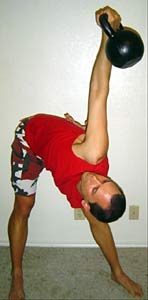Strength & Conditioning for Taekwondo, the Party Way
Frankie Faires, RKC
December 21, 2004 08:34 AM
A few years back, I came across Pavel's work. He totally screwed up my whole idea of strength and conditioning. I thought the best way to work out was to use supersets, pyramid,s and compound sets. I resisted the "Party Line" at first. Change is always uncomfortable but I kept coming back to it. I guess you know the truth when you can't take your eyes off of it. Pavel opened my mind to an entirely new way of doing things.
Rewind a few years (pre-Pavel). I used to have no problem training Taekwondo athletes. We would do some stretching, push-ups, forms, drills, sparring, running, abs and stretching, and call it a day. They got tired and I felt I had done my job. As a teacher, I had the confidence of ignorance.
Fast-forward a few years (post-Pavel). I was visiting a friend who was teaching a Taekwondo Class. Watching him reminded me of all the *@%$# I did when I was in Taekwondo. Quite predictably, I had the "If I only knew then what I know now?" thought. I got a little angry with myself. Why was I having these "has been" thoughts? Sure, I'm not in competition shape for Taekwondo, but what if I brought what I had learned to Taekwondo and modernized it? So, I did.
Here is one little wrench in the works ? I had to do strength and conditioning with 15 athletes and basically no equipment. I had a classroom full of 'Naked Taekwondo Warriors'. Here is a just a little taste of how I changed things without my favorite tools (
kettlebells, of course, Comrade!).
Warm-UpBeforeEveryone was used to doing static stretches before activity ? Most of the time that is a no-no.
AfterThe warm-up consisted of joint mobility, active, and dynamic flexibility moves. The warm-up increased in intensity and the stretches in amplitude as we progressed.
Technical / Tactical / Strategic TrainingBeforeEveryone was doing technical training after they were tired from doing some kind of endurance work.
AfterAlthough technique does need to be fatigue tested, it initially needs to be learned fresh. I put this at the top of the class after warm-ups.
Strength TrainingBeforeAre push-ups considered strength training or punishment?
AfterOne week in, the athletes were doing full pistols! The High Tension Techniques rock!
ConditioningBeforeBasically, they were doing Rocky Roadwork. They had long distance, stairs, hills and 100 yd dash days.
AfterThese athletes had to perform three 3-minute rounds with a minutes rest in between for competition. I had them perform periodized progressive sprints within that time frame. As they moved closer to competition, they moved their technical / tactical / strategic work into their conditioning training.
Core TrainingBeforeParalysis via various high rep sit-ups, crunches, and leg lifts
AfterFull contact twists (I had one barbell and a few plates). I applied a low set, low rep, high-tension approach. The kids I had doing planks, bridges, and gladiators.
StretchingBeforeFloor stretches and seated buddy stretching (where your friend lays on you until you just can't take the pain anymore).
AfterDifferent versions of Contract-Relax stretching ? my favorite being the standing front, side and back kick stretches with a partner, PNF style.
Comrades, these were just a few of the elements I changed within the class. It was a great experience with great results. If I had it to do over again, I'd do it different. The program worked well, but even innovation needs innovating from time to time. I believe good coaches are constantly innovating, experimenting and looking for that truth they can't take their eyes off of. Hope you found a little here, Comrades!
 Frankie Faires, RKC, is a strength and conditioning coach for Taekwondo Instructors and Athletes. To ask questions or find out more, visit him at www.train4tkd.com.
Frankie Faires, RKC, is a strength and conditioning coach for Taekwondo Instructors and Athletes. To ask questions or find out more, visit him at www.train4tkd.com.
Back